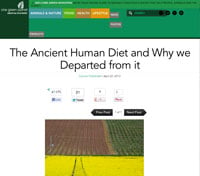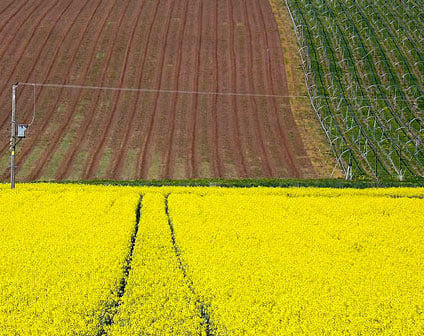The ancient human diet and why we departed from it
(This article first appeared at www.onegreenplanet.org on 22 April 2013)

Our eating habits have changed dramatically over the course of human evolution. From instinct-driven food selection to consciously choosing what to eat and when, our diets are essential for our lives. The provider of daily food needs is the physical and natural world ‘By means of photosynthesis, sunlight builds up complex compounds within plants which can then be used by animals when consumed and then stored by them as energy to grow and breed’ (Spencer, 1995). But what was the original diet of our primate forebears? Naturally, there is wide debate on this. On one hand, our pre-human hominid ancestors ate mostly fruit, leaves, tubers and nuts with only the very occasional lizard or small mammal. On the other, we consumed daily quantities of our animal brethren with calculated and intentional hunting. However, the confusion over originality is merely a timing issue as our pre-human hominid past contains a mixture of both.
We started off vegetarian
Skull examinations of Australopithecus afarensis and Australopithecus robustus, which existed in our pre-conscious past some 5-2 million years ago, reveal finer skull features including only small grinding teeth when compared to their later descendants. ‘There is certainly no evidence of these two hominids as predators or hunters…Dental evidence overwhelmingly shows a broad-spectrum vegetable diet’ (Spencer, 1995). Australian biologist Jeremy Griffith concurs ‘We know from such evidence as the wear patterns on their teeth that the australopithecines were vegetarian’ (Griffith, 2009). Further studies from anthropologists note that the stomach and digestive tracts of our ancient ancestors reveal ‘The majority of the food consumed by primates today–and every indication is for the last thirty million years–is vegetable, not animal.’ (Dunn, 2012). So while we did consume some meat in our primate past, it appears that the Australopithecines particularly, were predominantly vegetarian. This being the case, why did we change to meat-based diets? When did our hominid ancestors change from “gatherers” to “hunters”?

What caused us to become meat-eating?
Again, there are many and varied hypotheses on this issue but most seem to focus on the effects of the change not actually why the switch occurred. Popular theories include that it was a simple case of needing higher protein diets to fuel our increasing curiosity and travel, or being forced to eat meat as a result of climatic conditions i.e. drought, bushfire, extreme cold etc. While these theories may explain individual or specific occurrences, they fall short of the over-arching explanation. Australian biologist Jeremy Griffith attempts to provide this grand synthesis, Griffith contends that the change in our diets was psychologically driven and began some 2 million years ago. This dietary change was a by-product of the arrival of human consciousness, modern man, homo erectus, and with him, the human condition – the human condition being the inevitable clash between our gene and nerve-based learning systems. Griffith suggests that it was the struggle between our newly arrived conscious-self over an already long-established instinctive-self that was the origin of our anger, egocentricity and alienation that characterises modern society. It was this struggle that brought on our desire to ‘get even with nature’, as nature was representative of our original instinctive (now suddenly condemning) self. It was our psychological struggle with the human condition that led us down the carnivorous path. ‘Hunting was men’s earliest ego outlet’ (Griffith, 1988). Archaeological evidence during this time reveals increased and varied tool use, evidence of a wide variety of small and medium sized animals being consumed. A change in the dental record is also noted: gone are the large, flat grinding cheek teeth and humans front teeth are shown to be sharper and longer than anytime in the past – ideal for nipping and tearing flesh. Also, not surprisingly (given we are witnessing a psychological change), brain volume increases ‘At the same time the brain has become larger and the cranium itself slowly evolves into a spherical shape’ (Spencer, 1995). So if our ape ancestors were once vegetarian and then became meat eating, how does this explain vegetarianism as it is practised by human’s today?
Where to from here?
Obviously, the fact that humans are conscious allows us to make the choices we want about the food we eat. People today change their diets for all kinds of reasons. For many, ‘…nutritional choices center around taking better care of the earth’s resources and the environment, ethical issues about animal care, the use of antibiotics and growth stimulants for the production of animals, the threat of animal-borne diseases, and the health advantages of a plant-based diet’ (Craig, 2009).
But do we stop eating animals? Do we eat only vegetables? Which is the more environmentally friendly to produce? Can the world’s poor afford to live on organic, socially responsible and ethically produced food? These questions are overly complex and there is too much self-interest, mindless arguments, dogmatic assertions, personal psychosis and human emotion in such large volumes that any sensibility on this issue is overridden by more blogs, more opinions and no definitive resolutions. You end up either taking sides in the fierce debate about which is “right” or you just don’t care. All of which is perfectly legitimate – but irrelevant in the wider scale of the current state of human kind. As Carl Jung wrote in his 1933 book, Modern Man in Search of a Soul: ‘It is becoming more and more obvious that it is not starvation, not microbes, not cancer, but man himself who is mankind’s greatest danger; because he has no adequate protection against psychic epidemics, which are infinitely more devastating in their effect than the greatest natural catastrophes’. In light of Griffith’s grand synthesis, debate about the make-up of our daily diets is akin to discussing how to bake a cake while your house is burning down – it’s a non-issue. But humanity’s desire for escape and avoidance of our personal and shared psychosis means that taking a stance against carnivores, or making indulgent, ‘moral high ground’ decisions about our diets have become a poor substitute for a meaningful, balanced, rational, calm existence. Being a vegan and saving animals IS good, being a vegetarian and saving some animals IS ALSO good and being a meat-eater is not a sin either given your individual economic, social and geographic situation. But none of them are the crux issue facing humanity. And hence, by default, the dedication to the defence or advertisement of any of these persuasions is merely shouting to validate your own position. An exercise of which the world is all-too familiar. Bon appetit.
References
Craig, W.J 2009 ‘Health effects of vegan diets’ The American Journal of Clinical Nutrition [online], March 11
Dunn, R 2012 ‘Human Ancestors Were Nearly All Vegetarians’ Scientific American [online], July 23
Griffith, J 2009 ‘FREEDOM: At Last, the Liberation and Transformation of The Human Race Through the Finding of Understanding of The Human Condition’ WTM Publishing and Communications Pty Ltd, Sydney, Australia
Griffith, J 1988 ‘Free: The End Of The Human Condition’ Centre for Humanity’s Adulthood, Sydney, Australia
Spencer, C 1995 ‘The Heretics Feast: A History of Vegetarianism’ University of New England, Hanover, NH, USA
Vegetarian Statistics, 2012 ‘Vegetarian Research Group, 2012 Vegetarian Times, Harris Interactive Service Bureau’ [http://www.statisticbrain.com/vegetarian-statistics/], 16 October
Wikipedia 2013 ‘History of vegetarianism’ [online]
Image Source: Wikimedia Commons/Flickr




Please wait while the comments load...
Comments